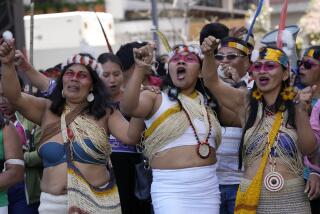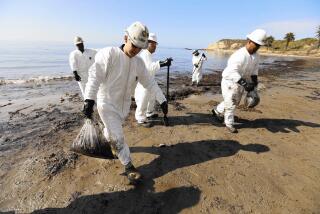Will It Be Business as Usual at the World Bank?
- Share via
In the wake of protests surrounding the World Bank and International Monetary Fund in Washington, D.C., the international financial institutions have renewed their pledge to alleviate poverty, protect the environment and fight corruption. But now that the streets of Washington have returned to normal, is it back to business as usual at the World Bank? We may have an answer soon. Within a month, the World Bank will decide whether to finance a controversial oil and pipeline project in Chad and Cameroon.
Three of the world’s largest oil companies--ExxonMobil, Royal Dutch Shell and the French company ELF--formed the original consortium that planned to sink 300 oil wells in the land-locked African nation of Chad and run a pipeline through neighboring Cameroon to the Atlantic coast. International concern about human rights abuses and environmental destruction and other problems, caused Shell and ELF to drop out. Now Chevron and the Malaysian company, Petronas, have joined ExxonMobil in the project.
The companies have said they won’t invest in the project without World Bank support, which can provide a measure of security against the risks of investing in such a politically volatile area. According to the U.S. State Department, state security forces in Chad and Cameroon are responsible for grave human rights abuses, including extrajudicial killings, torture and rape. Cameroon last year was rated the most corrupt country in the world for the second year in a row by the respected watchdog organization, Transparency International. In Chad, violence in the project region linked to the prospect of massive oil revenues has left hundreds of unarmed civilians dead, according to Amnesty International. The one member of the Chadian parliament who represents the oil-producing region spent eight months in a disease-ridden jail when he dared point out project-related corruption.
These signs all indicate that few of the financial windfalls from such a project will filter through corrupt government officials to reach the local people who the World Bank says it intends to help. In addition to exacerbating human rights problems, the pipeline project will also put the environment of the two countries in deeper jeopardy. The pipeline will traverse a largely intact area of tropical rainforest, home to indigenous people popularly known as Pygmies. In Cameroon alone, the pipeline will make 17 major river crossings, and it will run close along the Sanaga, one of Africa’s most important river systems. Pipeline leakage, groundwater contamination and fresh water and marine pollution are ever-present dangers. A leak would endanger communities all along the pipeline route that rely on surface water systems for most of their water needs.
In view of the current situation in these countries, the project likely will only exacerbate problems of corruption, environmental destruction and human rights abuses. A Republican-led congressional commission released a report this year criticizing the World Bank for investing in just these kinds of projects. In the wake of this criticism and the public scrutiny brought by the recent protests in Washington, the World Bank should not risk its reputation on such a mammoth, risky venture. It needs to put in place mechanisms to resolve the human rights and environmental problems before funding the project. In the meantime, the World Bank should finance smaller-scale projects that directly target the priorities of the poor and support sustainable development. Unless this taxpayer-funded institution proves it can meet its own sustainability mandates, public support for it only will continue to erode.
More to Read
Sign up for Essential California
The most important California stories and recommendations in your inbox every morning.
You may occasionally receive promotional content from the Los Angeles Times.













